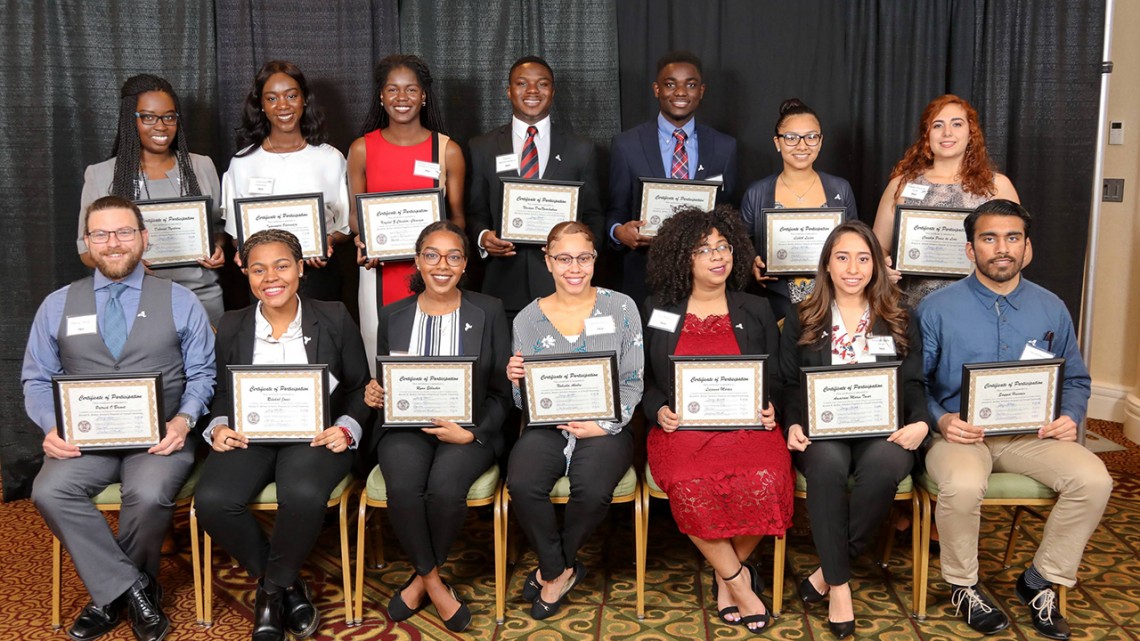
The new McNair Scholars Program inductees.
McNair Scholars Program honors future Ph.D.s
By Teagan Todd
The McNair Scholars Program inducted 15 new members as part of its annual ceremony on April 14. The program, which prepares undergraduate students for doctoral studies through mentoring and research opportunities, focuses on increasing the presence of traditionally underrepresented groups, such as first-generation students, students of color or those with low-income family backgrounds.
Lisa Nishii, associate professor of human resource studies in the ILR School and vice provost for undergraduate education, emphasized the importance of resilience in obtaining a Ph.D., as well as the importance of learning from mistakes. “As you embark upon your pursuit of truth… please promise me you’ll do so with both passion and discipline,” Nishii said.
Keynote speaker Barbara Oh ’11, Ph.D. ’17, is assistant director at Cornell’s Learning Strategies Center. Oh was introduced by 2016 inductee Rosario Majano ’18, who described Oh as “dedicated to promoting student growth by encouraging community participation, work-life balance and investment in personal development.”
Oh immigrated to the United States from South Korea as a young child. She recalled being the only person of color in her Texas elementary school and its associated challenges. She then described obtaining her B.A. and Ph.D. in sociology from Cornell. Oh said she struggled with impostor syndrome and personal setbacks, but reminded the audience that such struggles are common among doctoral students.
“You don’t have to do it alone,” Oh told the inductees, before encouraging them to use faculty mentors and resources throughout the process. She also said they should be proud of their designation as a McNair Scholar.
“The path we have chosen is not easy, but the rewards are enormous,” Oh said. “The reward is the ability to change society at every level.”
This year’s inductees have interests in a variety of research topics including wildlife conservation, climate change and epigenetics. Lizbeth Lucero ’20, a student in developmental sociology and a recent inductee, said being a McNair Scholar has allowed her to pursue her desired level of education while addressing issues she finds interesting and meaningful.
“Sometimes really prestigious universities forget that there’s a percentage of people who may identify with being first-generation, or being the first in their family to go to college, or the first in their family to obtain a Ph.D.,” said Lucero. “[The McNair program is] important because we’re meeting the needs of those populations, especially on campus. Diversifying the faculty and staff on campus, ensuring that in the future our kids have faculty that look like them – someone to look up to, someone who can guide them to conferences, to research opportunities – that to me is powerful.”
Fellow inductees Nahisha Alabre ’20 and Nana Antwi ’20 expressed similar sentiments. Alabre, a human development major, called the program “vital… for all underrepresented minority students.”
“I come from a place where I don’t know how to navigate or how to look through [so many] different resources,” said Alabre. “Having people to help me find what it is that I want, what’s best for me, what I need to do… that’s been the best part [of the program] and I’m very grateful.”
Antwi, also a human development major, said that for him the most important part of McNair is its focus on diversifying faculties and doctoral programs. “[McNair] is really giving minority students the opportunity to go to the highest point in academia,” Antwi said.
The McNair program honors the memory of Ronald E. McNair, the second African-American to fly in space. McNair died in the space shuttle Challenger’s 1986 explosion. The program’s funding, as well as the funding of other TRIO programs that assist first-generation and marginalized students, has been threatened in recent years by federal budget cuts.
Teagan Todd ’20 is an intern writer for the Cornell Chronicle.
Media Contact
Get Cornell news delivered right to your inbox.
Subscribe
